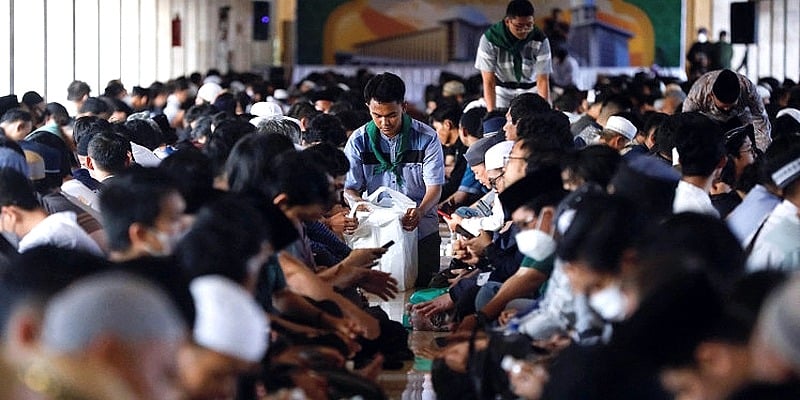We are only in the first few days of Ramadan and already many Muslims in Indonesia may have failed the test when they joined the chorus on social media condemning President Joko “Jokowi” Widodo as anti-Islam for telling officials not to hold gatherings for iftar after sunset.
Although the instruction issued on Wednesday, on the eve of the first day of Muslim fasting month, was specifically given to government officials, the stories that have gone viral since Thursday make it seem as if the ban applies to everyone, including those in the private sector. Worst, some even portray the President as banning iftar, period.
God only knows (yes, literally) how many thousands or possibly millions of Muslims violated Prophet Muhammad’s hadith: “If a man says to his brother, O’ kafir [disbeliever), then surely one of them is such.” One interpretation is that the accusation will come back to the accuser. Calling a fellow Muslim “anti-Islam” is even worse than calling someone kafir.
Experiences of past years show iftar gatherings thrown by government offices usually turned into big feasts. They were never small. And many government agencies would hold them more than once to accommodate as many stakeholders as possible, including journalists.
Many invitees would go home with gifts for good measure. They hold prayers and bring in famous preachers to give the Ramadan sermons, but these gatherings are most likely be remembered for how lavish they are.
These big iftar gatherings, which many private corporate sectors also throw, sometimes on an even bigger scale, are just one example of how Ramadan today has lost many of its spiritual values.
It is no longer seen as a contradiction that in the one month of the year when Muslims are fasting (and they make up 88 percent of the nation’s population of 280 million) it is also the time when they eat the most.
This is attested by the monthly inflation figure, which always runs highest in the year around Ramadan. The government has accepted this and stocks up on essential basic food stuffs, bringing in imports if necessary.
The feasts begin in the weeks before Ramadan (called pre-Ramadan dinner), and continue with big iftar celebrations in offices, companies, hotels or in restaurants, throughout the month, and later in the days and weeks after Idul Fitri, for so-called halal-bihalal gatherings.
They may be feeding the poor as Islam instructs its followers to do during Ramadan, but looking at how large these feasts are, they are feeding themselves even more.
For hotels and restaurants, Ramadan is always a harvest time. Department stores cash in on Idul Fitri celebrations as people spend big.
This is not exclusive to Islam though, since we observe similar “grand sales” banners by these stores around Christmas and the Chinese New Year.
And there is the mudik (exodus) of people from big cities to rural areas to celebrate Idul Fitri at the end of Ramadan, preceding the big feasts.

Ramadan today is not only taking on a more secular outlook, but it has become a huge commercial project.
Feasts, shopping and travels are rapidly eclipsing the spiritual values the month is supposed to be about: a time for self-reflection and spiritual improvement, and a time to hone good characteristics, such as honesty, humility, restraint, solidarity and many others that will take you through the next 11 months.
Those old enough to remember will say it was not like this 20 or 30 years ago.
Some may argue this reflects the nation’s growing prosperity, but others would say this also reflects declining religious values, even as the nation is supposed to have become more conservative.
Blame President Jokowi’s minders for linking his instruction not to hold iftar gatherings with limiting social mobility restrictions, when clearly that policy, which was imposed during the COVID-19 pandemic, is no longer in place, or necessary.
Critics had a field day drawing a list of big gatherings that had taken place in the past year, including the massive wedding ceremony of his third son in Surakarta, Central Java, in December, and the Korean girl band Blackpink’s huge concert at the Bung Karno Stadium in Senayan, Jakarta, earlier this month.
This, however, still does not justify calling the President anti-Islam.
This is one of those government policies that had the best intentions but went sour and got widely rejected because of poor public relations on the part of the presidential office.
Coming on the heels of the widespread criticisms against tax and customs officials for flaunting their wealth, the instruction could have stressed that this restriction is an example of the President’s call for government officials to moderate their lifestyles.
Holding iftar feasts would seem extravagant this time.
And given how massive and lavish many government and corporate iftar gatherings have become, the instruction could have been coupled with the appeal for more moderation in observing religious rituals, a theme widely endorsed by Nahdlatul Ulama (NU) and Muhammadiyah, the two largest Islamic mass organizations in the country.
Throwing big feasts is a form of extremism.
There is nothing wrong with people going to iftar gatherings with friends and relatives, and these would likely be in small groups, and only as lavish as they want or can afford.
Better still, the message could go further and encourage government officials to have their iftar at home with their family. There is no better place to reinforce one’s faith.
ADVERTISEMENT
ADVERTISEMENT








































